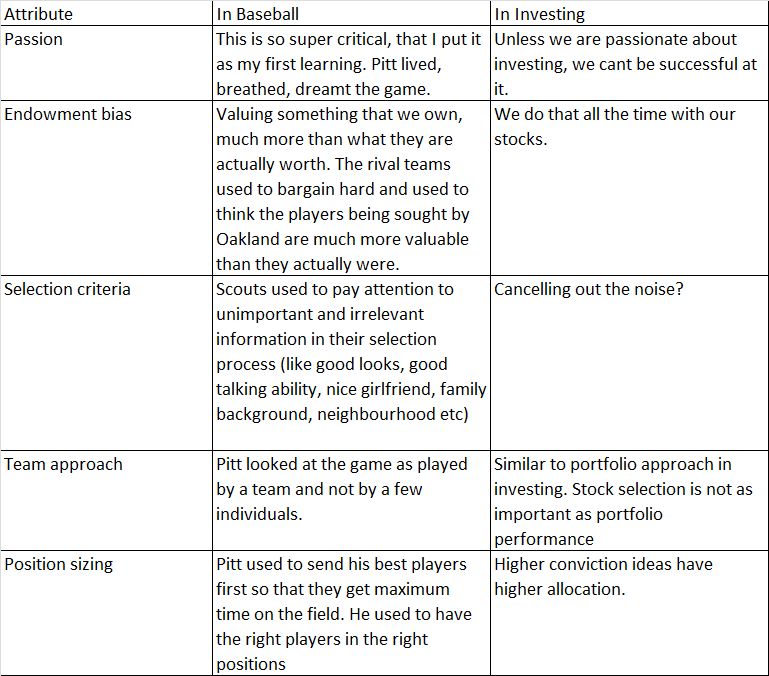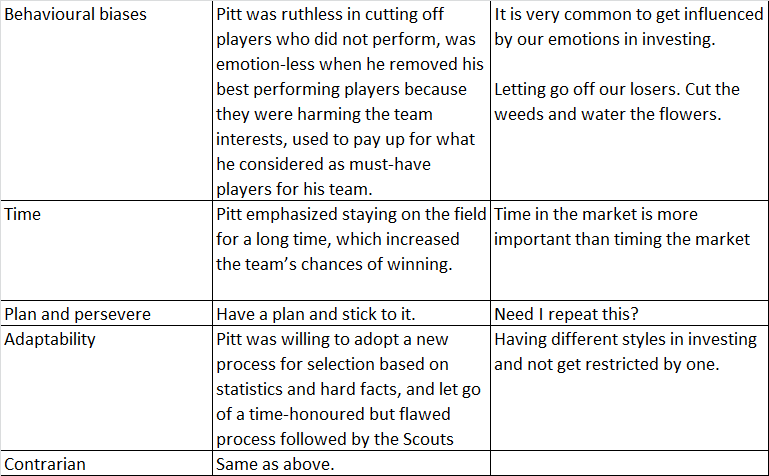Many times we would be reading something or watching something or listening to something completely unrelated to investing, and sub-consciously our mind would start drawing parallels between that and what happens in the stock markets.
Recently I came across a book and movie by Michael Lewis called Moneyball. I recently read his book The Big Short (which is soon to be released as a movie) which is based on the subprime crisis. I also had heard about his first book Liar’s Poker, which is known as the Bible for Wallstreet wannabes. Therefore I was intrigued enough to download the movie Moneyball, which I watched, and also the book, which I plan to read (actually listen, since I prefer audiobooks).
Moneyball is based on baseball. There is a team (Oakland’s) which is managed by a General Manager (played by Bradd Pitt). His character is Billy Beane who was a college baseball prodigy, and who was offered a chance to play professional baseball, which he took up forgoing a full scholarship to Stanford. It seems that he was not very successful as a professional player, and soon he went into team management. His team (Oakland’s) was an average team and used to get frequently knocked out before reaching playoff’s. However, the team always used to have some star players, which used to get taken over by rival teams at higher prices, which Oakland could not afford. So, as an annual ritual, the Scouts (selectors) used to find replacements for them which they could afford. They used to start off with quantitative data (a little bit) but used to base their judgements more on qualitative factors. Bradd Pitt was not in complete agreement with this approach to selection.
Also there is a practice to swap players between teams based on requirements. For eg, if a team needs a defense player, it would bargain with a rival team and arrange to either buy out the existing contract or swap another player that the rival team wants. In one of such meetings, Bradd Pitt meets a young graduate passout from Yale who had a degree in Economics, and he is very surprised at his presence in a baseball meeting. Upon being coerced, the young graduate opens up to him and says that the method of selection of players followed by all the teams is completely wrong. Using statistics, and probabilities he shows Pitt how they can build a champion team within the resources they have. And the story is about this selection and how the team progresses. The ending has a twist so I will not give it away.
Now why did a financial author like Michael Lewis write about baseball? There are a lot of similarities between this and investing. I give below my impressions as I watched the movie.
Some of the points I didn’t agree with:
- Reliance on past statistics completely – this may not work all the time in investing as one should try and be where the puck is going to be, not where it was.
- Winning is all – Pitt did not play for records and believed that winning was paramount. In investing the process is as important, if not more, than the result.
- Believing in Jinx – Pitt never watched games live. Yet, he went to watch the most important game against his daughter’s instructions not to jinx it. And when he went, his team started losing, and so he walked away, and they started winning again. Not strictly related to investing, but we also sometimes are susceptible to such biases.
I am sure there will be a lot more information on the net and presented in a better manner. Also, if one is interested, one can search the web for a torrent file of the movie and audio book and download it. It was time well spent for me.




